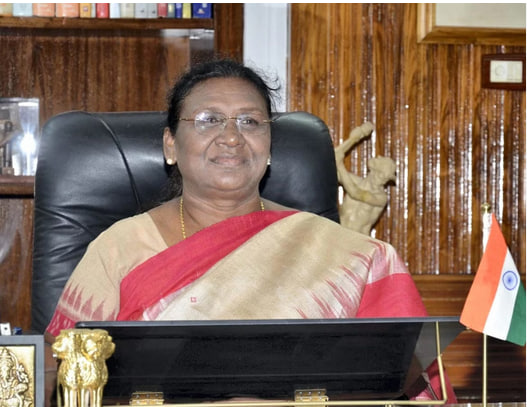Founding ideals : On President Murmu’s first Republic Day address to the nation
Adherence to basic principles of the Constitution is What unifies India
In her first and customary Republic Day address to the nation, President Draupadi Murmu reiterated the founding ideals of the Republic on-the-eve of the 74th anniversary of the adoption of its Constitution. As the first tribal woman to occupy the highest office in the country, the 15th President of India is emblematic of the Republic’s continuing journey of democracy, pluralism and empowerment of the weaker sections. The values of fraternity and democracy that its founding leaders etched into the genetic makeup of the modern nation were derived from the learnings of an ancient civilization . Ms. Murmu underscored this quality of the Republic — the amalgamation of the old and the new, the traditional and the modern. A unified and unifying struggle against British imperialism , as the President noted, was “as much about winning Independence as about rediscovering our own ideals”. Ms. Murmu laid-emphasis on the “ essence of India” — which is profound and predictable at once. “We have succeeded... because so many creeds and so many languages have not divided us, they have only united us.” A commitment to this creed has sustained the modern nation, and the long and ancient civilisation that evolved and reformed over millennia .
It can be argued that the Republic is continuously in formation, as thoughts and ideas emerge. As new ambitions inspire the country, some foundational principles must remain the timeless codes for survival and success. Ms. Murmu’s address reiterated those, while celebrating India’s successes in various fields, particularly the economy. While noting India’s emergence as an influential leader in global affairs , she underscored the principles of Sarvodaya and Atmanirbhar Bharat — uplift of all, and self-reliance — which are guiding the government as they have the earlier ones. Oppression and debilitating poverty continue to shackle vast sections, and India must constantly remember this fact, and certainly on occasions when it reflects on its progress. At various points, challenges to the ideals of the Constitution and the national movement arose in the form of political authoritarianism , sectarian extremism , and separatism , but India overcame them — a reason for satisfaction but also a call-for constant vigil . Ms. Murmu’s reiteration of the founding principles of the Republic, and her reassurance to fellow citizens come at time when the sanctity of the Constitution is under attack. While debate about the Constitution is also part of the democracy it establishes , adherence to its basic principles is what unifies the people of India. Ms. Murmu made that point.
